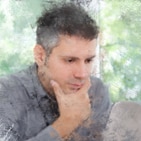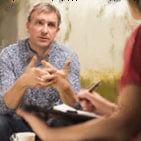Prečítajte si odpovede na najčastejšie otázky o nízkej hladine testosterónu, jeho diagnostike a liečbe
Odpoveď se Vám zobrazí po kliknutí na otázku.
What has caused my low testosterone?
Low testosterone can be caused by various reasons. The most common cause of low testosterone is obesity, especially belly fat. Other common causes include chronic stress, metabolic syndrome, type 2 diabetes and use of certain medications. Head injury and testicular damage to the testicles (caused by for example illness, surgery or sport) can also cause low testosterone.
How can I tell if I have low testosterone?
If you’re rarely in the mood for sex, often feel tired and perhaps have difficulty getting an erection, you may have low testosterone. Other common signs are increased body fat, especially belly fat, low mood, decreased muscle mass, weakness and fatigue. However, low testosterone is often ignored by suffering men because they think they’re just “getting old”.
Low testosterone is not an easy subject to talk about, especially if you are having sexual problems. However, if you suspect that you are experiencing symptoms of low testosterone, it is important that you tell your doctor. All that is needed to find out whether you have low testosterone is a simple blood test that will measure your testosterone level.
Why is testosterone important to my health?
Testosterone not only enables you to have an erection and experience sexual desire (libido) and pleasure, it is also important for maintaining muscles, strength, healthy bones, positive mood, energy and overall health.
Why is it important to treat low testosterone?
Untreated low testosterone increases your risk for several health problems, such as obesity, heart disease, diabetes, osteoporosis, depression and even premature death.
How can my low testosterone be treated?
The most common treatment for low testosterone is testosterone therapy. It increases your testosterone to a healthy level; in so doing, after a while (usually during the first year of treatment) your symptoms will become less intense and may even disappear with long-term testosterone therapy.
Testosterone therapy is available in different preparations, the most common are injections - which can be long-acting (requiring few injections per year) or short-acting (requiring many injections per year) – and cream/gel or capsules.
Diagnostika nedostatku testosterónu
Existuje niekoľko spôsobov, ako vám môže byť diagnostikovaný nedostatok testosterónu. Návšteva všeobecného lekára je vždy dobrým prvým krokom. V prípade potreby vás môže odporučiť k špecialistovi. Odborníci, ktorí sa špecializujú na zdravie mužov, sú urológovia a endokrinológovia. Čoraz viac všeobecných lekárov a internistov sa však začína špecializovať aj na otázky zdravia mužov.
Urológovia sa špecializujú na poruchy reprodukčných orgánov, obličiek a močových ciest. Takisto sa zaoberajú problémami s erekciou, skríningom rakoviny prostaty a liečbou ochorení prostaty.
Endokrinológia je odvetvie medicíny zaoberajúce sa hormonálnymi funkciami a hormonálnymi chorobami. Lekári preto často posielajú pacientov na endokrinológiu na ďalšie vyšetrenie, napr. v prípade vývojových porúch súvisiacich s testosterónom v puberte.
Návšteva u lekára sa začne rozhovorom. Bude sa pýtať na príznaky a urobí úplnú anamnézu. Nasleduje telesné vyšetrenie, pri ktorom lekár sleduje fyzikálne parametre hypogonadizmu, ako sú ochlpenie, suchá pokožka, telesný tuk a držanie tela. Potom lekár nariadi laboratórne vyšetrenie, najmä na stanovenie hladín hormónov.
- na akékoľvek predchádzajúce choroby (napr. zápal semenníkov)
- na akékoľvek predchádzajúce relevantné operácie, ktoré môžu mať vplyv na produkciu testosterónu
- na akékoľvek rizikové faktory, ako sú systémové choroby a určité druhy liekov
- na životný štýl vrátane pohybu, stravovania, stresu a konzumácie alkoholu
- na schopnosť udržať erekciu
- na výskyt ranných erekcií
- na sexuálne uspokojenie
- na množstvo ejakulátu
- na frekvenciu pohlavného styku alebo masturbácie
Lekár môže tiež skontrolovať štruktúru ochlpenia, svalovú hmotu, silu a takisto tvrdosť a veľkosť semenníkov. Váš lekár možno bude chcieť presnejšie určiť hladinu testosterónu v krvi. Z tohto dôvodu vám odoberie malé množstvo krvi na odoslanie do laboratória na analýzu – najlepšie ráno, pretože hladiny testosterónu v krvi sú vtedy najvyššie. Ak máte koncentráciu testosterónu od 11 do 35 nmol/l, ste považovaný za zdravého. Liečba testosterónom sa odporúča vtedy, ak je váš ranný testosterón nižší ako 11 nmol/l.
Liečba nízkej hladiny testosterónu
Účinnosť liečby testosterónom bola preukázaná v niekoľkých štúdiách a počas viac ako 50 rokov skúseností. Liečba môže výrazne zlepšiť duševnú a fyzickú pohodu a výkonnosť mužov s nedostatkom testosterónu a pridruženými príznakmi. Mnoho pacientov uvádza pozitívne účinky na celkovú náladu, sebadôveru a vitalitu. Tvar tela a proporcie sa opäť stávajú mužskými. Zvyšuje sa svalová hmota a sila svalov, zatiaľ čo množstvo tuku sa znižuje. Môže sa zabrániť dlhodobým následkom nedostatku testosterónu (napríklad osteoporóza). Liečba testosterónom spôsobuje výrazné zlepšenie sexuálnej túžby a erekcie.
Nie. Zlepšenie celkového zdravotného stavu a pohody vďaka liečbe testosterónom si všimnú len muži s nedostatkom testosterónu a súvisiacimi príznakmi. Každý liek môže mať isté vedľajšie účinky, preto je počas liečby testosterónom nevyhnutné pravidelné monitorovanie.
Akýkoľvek liek môže mať vedľajšie účinky a preparáty testosterónu nie sú výnimkou. Mnohoročné skúsenosti s preparátmi testosterónu však ukázali, že znášanlivosť liečby je vo všeobecnosti dobrá.
Nižšie uvedené možné vedľajšie účinky sa nevyskytujú u každého pacienta. Treba mať však na zreteli, že rôzne preparáty a aplikačné formy (injekcie, gél, náplasti, kapsuly, implantáty) sa môžu líšiť z hľadiska účinnosti a vedľajších účinkov. Vždy si dôkladne prečítajte príbalový leták predpísaného lieku.
Na začiatku liečby sa niekedy môže vyskytovať mierne akné. Testosterón stimuluje aktivitu mazových žliaz v koži. Zvýši sa totiž prísun mazu do pokožky, čo priaznivo pôsobí na suchú a vráskavú pokožku. Na začiatku liečby sa však môže vyskytnúť aj nadprodukcia tejto olejovitej látky (mazu), čo môže spôsobiť akné. Je to však len prechodná fáza na začiatku liečby, ktorá sa zvyčajne sama ustáli.
Zriedkavo sa môžu vyskytnúť časté alebo trvalé bolestivé erekcie (priapizmus). Vtedy musí byť dávka testosterónu znížená alebo prerušená, aby sa zabránilo trvalému poškodeniu.
Vo veľmi zriedkavých prípadoch sa u mužov s vhodnou dispozíciou (napr. obezita alebo chronické ochorenie pľúc) môže vyvinúť spánkové apnoe (dočasné zastavenie dýchania). Po vysadení liečby testosterónom spánkové apnoe ustúpi.
Ak nastane zvýšenie produkcie červených krviniek (polyglobúlia), môže to ovplyvniť cirkuláciu kvôli zvýšenej viskozite krvi. V tomto prípade sa liečba preruší, až kým sa tvorba krvných buniek nevráti do normálu.
Vysoké dávky testosterónu alebo dlhodobá liečba môžu zvýšiť tendenciu zadržiavať vodu v tkanivách (opuchy) a môžu ovplyvniť odbúravanie tukov v tele.
Váš lekár bude pravidelne monitorovať priebeh liečby a kontrolovať akékoľvek vedľajšie účinky. Ak počas liečby zaznamenáte nepríjemné pocity alebo nejaké problémy, oznámte to čo najskôr svojmu lekárovi.
Nie. Ak neexistujú žiadne ďalšie kontraindikácie, pre liečbu testosterónom neexistuje veková hranica.
Áno. Niektoré štúdie dokonca naznačujú, že liečba testosterónom môže mať priaznivý vplyv na liečbu ED. Pred kombináciou jednotlivých terapií sa však poraďte so svojím lekárom.
Ako dlho by mal pacient s hypogonadizmom (deficit testosterónu) podstupovať liečbu testosterónom?
Niekoľko štúdií preukázalo, že priaznivé účinky liečby testosterónom sa po ukončení liečby nezachovajú.
1-7 Platí to pre zlepšenie stavby tela (strata telesného tuku a zvýšenie svalovej hmoty), erektilnej funkcie, sexuálnej stimulácie, kontroly hladiny cukru v krvi. (HbA1c), profilu cholesterolu, krvných tukov (triglyceridov), príznakov „starnúcich mužov“ (AMS), medzinárodného skóre prostatických symptómov (IPSS), medzinárodného indexu erektilnej funkcie (IIEF), zvyškového objemu vyprázdňovania a hrúbky steny močového mechúra a kvality života a pravdepodobne väčšiny (ak nie všetkých) ďalších výsledkov súvisiacich s testosterónom.1-4,6
Ak sa liečba testosterónom preruší, priaznivé účinky sa znovu objavia po jej obnovení.1
Uvádza sa, že ukončenie liečby testosterónom vedie k opätovnému výskytu príznakov a zvráteniu prínosov liečby do 6 mesiacov. Liečba testosterónom je pravdepodobne potrebná celoživotne na zabezpečenie pretrvávajúceho zmiernenia príznakov a zachovanie zdravotných prínosov liečby u väčšiny mužov.8
Ostatné
Návaly tepla nezažívajú len ženy v menopauze. U mužov s nedostatkom testosterónu sa tiež môžu vyskytnúť návaly tepla, niekedy aj s nadmerným potením, hoci je to zriedkavejšie ako u žien.
Nie, nedostatok testosterónu nemá žiadny vplyv na veľkosť penisu. Môže mať však negatívny vplyv na sexuálnu výkonnosť, libido a erektilné funkcie.
Nie. Všetci muži s pribúdajúcim vekom trpia poklesom hladiny testosterónu. Rýchlosť poklesu hladiny testosterónu závisí od rôznych faktorov vrátane genetiky, životného štýlu a predispozície k chorobám.
Diagnosis of testosterone deficiency
How do I find the right doctor?
Depending on the health system of the country you are living in, there are several ways to get a diagnosis for testosterone deficiency. Visiting your family doctor is always a good first step. If necessary, they can refer you to a specialist. Those specialising in men’s health are generally urologists and endocrinologists. However, increasingly, many general practitioners and internists are also specialising in male health issues.
Urologists specialise in disorders of the reproductive organs, kidneys and urinary tract. Erection problems, screening for prostate cancer and the treatment of prostate diseases are also the province of the urologist.
Endocrinology is the branch of medicine dealing with hormone function and hormone-related diseases. Physicians therefore often refer patients to an endocrinologist for further investigations, e.g. in the case of testosterone-related developmental disorders in puberty.
What tests will the doctor do?
The doctor will begin with a medical interview. He/she will ask about your symptoms and take a full medical history. A physical examination follows where the doctor will look out for physical features of hypogonadism such as body hair, dry skin, body fat and posture. After this, laboratory test will be ordered, particularly for the determination of hormone levels.
How can my low testosterone be treated?
- any previous diseases (e.g. inflammation of the testes)
- any previous relevant operations which can influence your testosterone production
- any risk factors such as systemic diseases and certain types of medication
- your lifestyle, including exercise, diet, stress and alcohol consumption
- your ability to maintain an erection
- the occurrence of morning erections
- your sexual satisfaction
- the amount of ejaculate
- the frequency of sexual intercourse or masturbation
The doctor may also check the body hair pattern, muscle mass and strength, and the hardness and size of your testicles. Your doctor may want to determine your blood testosterone level more accurately. For this, you will need to give a small amount of blood to be sent off to a laboratory for analysis. This is best taken in the morning, as blood testosterone levels are at their highest then. If you have a testosterone concentration between 11 and 35 nmol/l, you are considered normal. Testosterone treatment is recommended if your morning testosterone is below 11 nmol/l.
Treatment of low testosterone
What are the benefits of testosterone treatment?
The effectiveness of testosterone treatment has been proven in several studies and more than 50 years of experience. The treatment can considerably improve mental and physical well-being and performance in men with testosterone deficiency and associated symptoms. Many patients report positive effects on general mood, self-esteem and vitality. Body shape and proportions become more masculine again. Muscle mass and muscle strength increase, whereas fat decreases. Long term effects of a testosterone deficiency (such as osteoporosis) can be prevented. Testosterone treatment leads to a marked improvement in sexual desire and erections.
Can all men benefit from testosterone treatment?
No. Only men with testosterone deficiency and related symptoms will notice improvements in their general health and well-being from testosterone treatment. Furthermore, as any medical product can have side effects, regular monitoring is essential while testosterone treatment is taking place.
Are there any side effects of testosterone treatment?
Any drug can have side effects and testosterone preparations are no exception. However, many years of experience with testosterone preparations have shown that the treatment is generally well tolerated.
The following possible side effects do not occur in every patient. It should also be taken into account that the different preparations and application forms (injection, gel, patches, capsules, implants) can vary in their effectiveness and side effects. You should always read the product information of the preparation you have been prescribed.
Occasionally mild acne occurs at the beginning of treatment. Testosterone stimulates the activity of the sebaceous glands in the skin. This has the desired effect of increasing the oil supply to the skin and counteracting dry and wrinkled skin. However, overproduction of an oily substance called sebum – which can result in acne – can occur at the beginning of treatment. This is almost always a passing phase at the beginning of treatment and usually normalises by itself.
In rare cases, frequent or sustained painful erections (priapism) can occur. In these cases, the dosage must be reduced or discontinued to avoid permanent damage.
In very rare cases, men with an appropriate disposition (e.g. obesity or chronic lung disease) may develop sleep apnoea (temporary breathing arrest). Sleep apnoea disappears again when testosterone treatment is discontinued.
If there is an increase in the production of red blood cells (polyglobuly), circulation may be affected due to an increased blood viscosity. In this case treatment is discontinued until blood cell production normalises.
High doses of testosterone, or doses over long periods can increase the tendency to retain water in the tissues (edema) and can affect the breakdown of fat by the body.
Your doctor will regularly monitor the progress of your treatment and check for any side effects. If you experience any discomfort or inconveniences during treatment, please report it to your doctor as soon as possible.
Is it possible to be too old to receive testosterone treatment?
No. As long as there are no other contraindications, there is no age limit to receiving testosterone treatment.
Is it safe to be on testosterone treatment and take drugs for erectile dysfunction (ED)?
Yes. Some studies even suggest that testosterone treatment received in combination with ED medication may improve how your ED drug works. However, discuss with your doctor before combining therapies.
Is testosterone therapy a lifelong treatment?
How long should patients with hypogonadism (testosterone deficiency) be on testosterone therapy?
Several studies have demonstrated that the beneficial effects of testosterone therapy are not maintained after cessation of treatment.1-7 This applies to improvements in body composition (loss of body fat and gain of muscle mass), erectile function, sex drive, blood sugar control (HbA1c), cholesterol profile, blood fats (triglycerides), Aging Males' Symptoms (AMS), International Prostate Symptom Score (IPSS), The International Index of Erectile Function (IIEF), residual voiding volume and urinary bladder wall thickness, and quality of life, and likely most – if not all - other testosterone-related outcomes.1-4,6
If testosterone therapy is discontinued, beneficial effects to appear again when testosterone therapy is resumed.1
As pointed out in the British Society for Sexual Medicine guidelines on Adult Testosterone Deficiency, termination of testosterone therapy results in reappearance of symptoms and reversal of benefits within 6 months; therefore, testosterone therapy is likely to be required lifelong for persistent symptom resolution and maintenance of health benefits in most men.8
Other
I thought hot flushes were only experienced by women going through menopause?
Not only menopausal women have hot flushes. Men with testosterone deficiency may experience hot flushes too, sometimes with sweating attacks too, though it is more rare than that in women.
Does testosterone deficiency affect the size of my penis?
No, testosterone deficiency does not have any effect on penis size. However, it can have a negative effect on sexual performance, libido and erectile function.
Does declining testosterone levels make me less of a man?
No. All men suffer declining testosterone levels with age. How quickly the levels decline depends on various factors, including genetics, lifestyle and predisposing medical conditions.
Referencie
- Yassin A, Almehmadi Y, Saad F, Doros G, Gooren L. Effects of intermission and resumption of long-term testosterone replacement therapy on body weight and metabolic parameters in hypogonadal in middle-aged and elderly men. Clin Endocrinol (Oxf). 2016;84(1):107-114. Return to content
- Hackett G, Cole N, Mulay A, Strange RC, Ramachandran S. Long-Term Testosterone Therapy in Type 2 Diabetes Is Associated with Decreasing Waist Circumference and Improving Erectile Function. The world journal of men's health. 2018. Return to content
- O'Connell MD, Roberts SA, Srinivas-Shankar U, et al. Do the effects of testosterone on muscle strength, physical function, body composition, and quality of life persist six months after treatment in intermediate-frail and frail elderly men? J Clin Endocrinol Metab. 2011;96(2):454-458. Return to content
- Morgunov LY, Denisova IA, Rozhkova TI, Stakhovskaya LV, Skvortsova VI. Hypogonadism and its treatment following ischaemic stroke in men with type 2 diabetes mellitus. The aging male : the official journal of the International Society for the Study of the Aging Male. 2018:1-10. Return to content
- Francomano D, Bruzziches R, Barbaro G, Lenzi A, Aversa A. Effects of testosterone undecanoate replacement and withdrawal on cardio-metabolic, hormonal and body composition outcomes in severely obese hypogonadal men: a pilot study. J Endocrinol Invest. 2014;37(4):401-411. Return to content
- Yassin A, Nettleship JE, Talib RA, Almehmadi Y, Doros G. Effects of testosterone replacement therapy withdrawal and re-treatment in hypogonadal elderly men upon obesity, voiding function and prostate safety parameters. The aging male : the official journal of the International Society for the Study of the Aging Male. 2016;19(1):64-69. Return to content
- Ng Tang Fui M, Hoermann R, Zajac JD, Grossmann M. The effects of testosterone on body composition in obese men are not sustained after cessation of testosterone treatment. Clin Endocrinol (Oxf). 2017;87(4):336-343. Return to content
- Hackett G, Kirby M, Edwards D, et al. British Society for Sexual Medicine Guidelines on Adult Testosterone Deficiency, With Statements for UK Practice. The journal of sexual medicine. 2017;14(12):1504-1523. Return to content









